The press conference of Jiangxi Provincial People’s Government on "Perfecting the Arbitration System and Improving the Arbitration Credibility" was held in Nanchang.
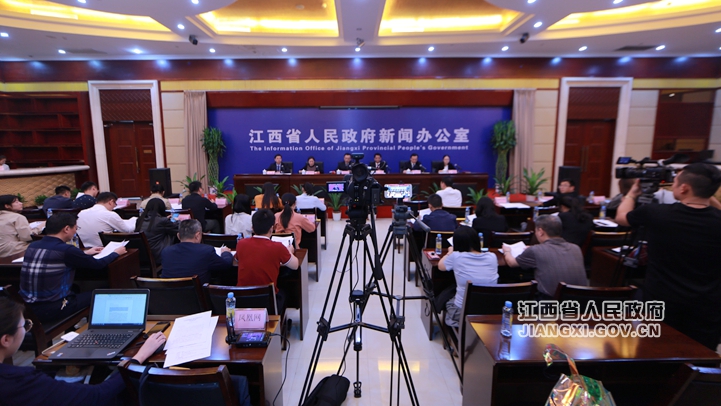
Press conference site (photo by Huang Yuting)
On October 15th, the Information Office of Jiangxi Provincial Government and the Provincial Department of Justice jointly held a press conference on "Improving the Arbitration System and Improving the Arbitration Credibility". Gong Hexing, deputy director of the Provincial Department of Justice, introduced the implementation opinions on improving the arbitration system and improving the credibility of arbitration in our province. Yang Guoan, full-time member of the Judicial Committee of the Provincial Higher People’s Court, Zhou Huaai, vice chairman of the Provincial Federation of Industry and Commerce, Wan Xiu Qi, deputy mayor of Nanchang Municipal People’s Government, and Zhang Zhonglan, director of the Notarization and Arbitration Division of the Provincial Department of Justice, attended the press conference and answered questions from reporters. Li Feng, deputy director of the Foreign Information Office of the Provincial Government Information Office, presided over the press conference.
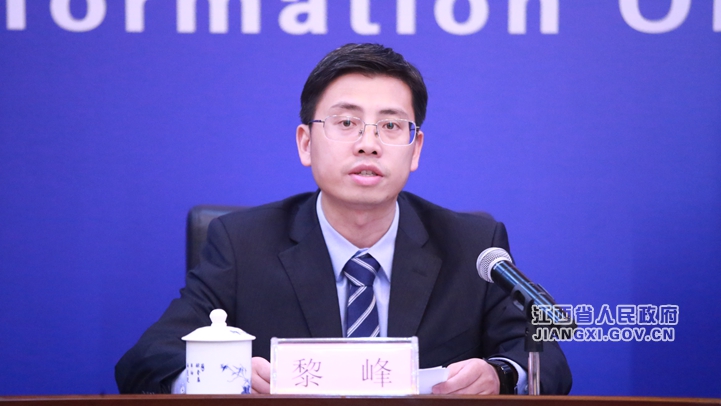
Li Feng, Deputy Director of the Foreign Information Office of the Provincial Government Information Office (photo by Huang Yuting)
Li Feng:
Dear journalists and friends,
Good afternoon, everyone. Welcome to the press conference of the Provincial Government Information Office.
Arbitration is an internationally accepted way to solve disputes, and arbitration law is an important law to solve civil and commercial disputes in China. In order to implement the requirements of the Central Committee for arbitration and better promote the healthy development of arbitration in our province, on September 23rd, the General Office of the Provincial Party Committee and the General Office of the Provincial Government issued the Implementation Opinions on Improving the Arbitration System and Improving the Arbitration Credibility (hereinafter referred to as the Implementation Opinions).
This morning, we are very pleased to invite Mr. Gong Hexing, member of the party group and deputy director of the Provincial Department of Justice, Mr. Yang Guoan, full-time member of the Judicial Committee of the Provincial Higher People’s Court, Ms. Zhou Hua Ai, vice chairman of the Provincial Federation of Industry and Commerce, Mr. Wan Xiu Qi, deputy mayor of Nanchang Municipal People’s Government, and Ms. Zhang Zhonglan, director of the Notarization and Arbitration Division of the Provincial Department of Justice, and ask them to introduce the implementation opinions and answer questions from reporters.
Next, please introduce the relevant information to Deputy Director Gong Hexing.
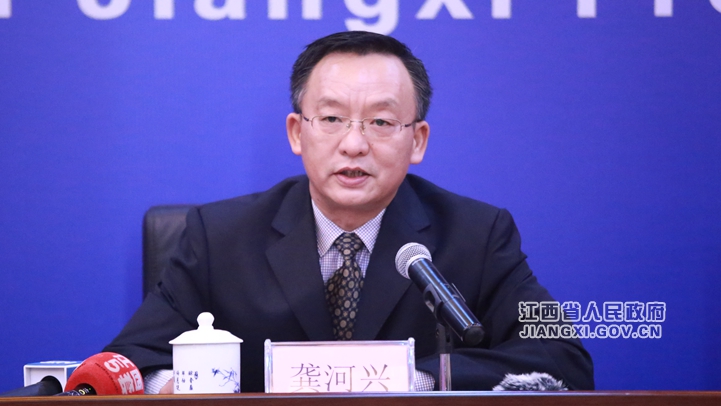
Gong Hexing, Deputy Director of the Provincial Department of Justice (photo by Huang Yuting)
Gong Hexing:
Dear journalists and friends,
Good afternoon everyone!
On August 30, 2019, the Sixth Meeting of the Comprehensive Deepening Reform Committee of the Provincial Party Committee reviewed and passed the "Implementation Opinions of Jiangxi Province on Improving the Arbitration System and Improving the Arbitration Credibility". On September 23, the General Office of the Provincial Party Committee and the General Office of the Provincial Government issued the "Implementation Opinions on Improving the Arbitration System and Improving the Arbitration Credibility" (Gan Ban Zi [2019] No.31, hereinafter referred to as the "Implementation Opinions"), requiring all localities and departments to conscientiously implement it in light of the actual situation. Today, mainly through the influential platform of the provincial government press conference, we briefly introduce the implementation of the central document and the implementation opinions issued by our province to friends in the press.
I. Relevant background and main features of the Implementation Opinions.
Arbitration is an internationally accepted way to solve disputes, and Arbitration Law is an important law to solve civil and commercial disputes in China, which has the institutional advantages of respecting the parties’ autonomy, convenience and efficiency. Arbitration, together with mediation, administrative adjudication, administrative reconsideration and litigation, has become an important part of diversified dispute resolution mechanism. Over the past 25 years since the promulgation of the Arbitration Law, arbitration institutions have closely focused on the work of the party and the state center, consciously served the overall situation of economic and social development, and properly resolved a large number of disputes. By the end of 2018, a total of 255 arbitration committees had been established nationwide, handling more than 2.6 million cases of various types, with a target amount of more than 4 trillion yuan, involving more than 70 countries and regions. The 12 arbitration institutions in our province have accepted more than 14,200 cases of various types, with a bid of 36 billion yuan, which has made important contributions to the economic and social development of our province. However, there are also some problems, such as political affairs are not divided, the management system is not smooth, the internal governance structure is not perfect, the competitiveness is not strong, the supervision and restriction mechanism is not perfect, and the support guarantee is not in place, which affects the credibility of arbitration and restricts the healthy development of arbitration.
The CPC Central Committee and the State Council attached great importance to arbitration. The Fourth Plenary Session of the 18th CPC Central Committee put forward the reform task of "improving the arbitration system and enhancing the credibility of arbitration", and the 19th CPC National Congress put forward to strengthen the construction of mechanisms to prevent and resolve social contradictions, which opened a new journey for the development of arbitration in Socialism with Chinese characteristics. In December last year, the General Offices of the General Office of the Central Committee of the CPC and the State Council issued Several Opinions on Improving the Arbitration System and Improving the Arbitration Credibility (No.76 [2018] of the Central Office, hereinafter referred to as "Several Opinions"), which pointed out the direction for the reform and development of arbitration in the new era and provided fundamental follow-up. In March this year, the National Arbitration Work Conference was held in Shanghai, and the proposal of "China Arbitration 2022" was put forward, which called for improving the arbitration system and enhancing the credibility of arbitration, implementing the arbitration law as the main line, perfecting the arbitration system and mechanism, constantly enriching the arbitration service mode, strengthening the construction of arbitration institutions and talent teams, and comprehensively improving the quality of arbitration.
The main features of our province’s "Implementation Opinions":
The first is to mark the center of the table. Focusing on the requirements of "improving the arbitration system and improving the credibility of arbitration" put forward by the central government, the tasks are decomposed and the measures are refined from the perspectives of implementing the arbitration legal system, improving the work management system, optimizing the governance structure and standardizing the development order of the industry. The second is to emphasize implementation. According to the system design, reform ideas and work requirements put forward in Several Opinions, combined with the actual situation in our province, specific projects are extracted, and the responsible units are determined to implement each item in the Implementation Opinions. The third is to pay attention to work innovation. In view of the fact that the arbitration work in our province has little influence and radiation ability, we should increase overall support and talent support, encourage the arbitration commission to reform and innovate in the system and mechanism, and demand that it be linked with the central and provincial classification to promote the reform of public institutions, which is in line with the spirit of the central government and the development trend of arbitration.
Second, the main contents of the "Implementation Opinions"
The Implementation Opinions consists of six parts, which are divided into 21 tasks and expressed in the logical order of "improving the arbitration system and improving the credibility of arbitration". First of all, improve and implement the arbitration system from two aspects: strictly implementing the arbitration legal system and rationalizing the arbitration management system; Then, we should pay close attention to optimizing the internal governance structure of arbitration institutions, strengthening the construction of arbitration professionals and cleaning up and rectifying the development order of arbitration to promote the credibility of arbitration. In addition, in view of the current situation that the development level of arbitration in our province is not high enough, the influence is small, and the regional radiation is not strong, a special train is set up to require relevant units to increase their support for arbitration work in various directions.
(1) Strictly implement the arbitration legal system. This is the basic point of the system, which strictly guarantees the implementation of the arbitration legal system in our province and strictly regulates the establishment and change of the arbitration commission. Strictly manage the branches of the Arbitration Commission and standardize its establishment procedures. If it is required that the Arbitration Commission and its offices be used as internal organs or subordinate units of administrative organs, the decoupling of people and property shall be completed before the end of this year, and the independent work of the Arbitration Commission shall be guaranteed without interference according to law.
(2) Improve the management system of arbitration. This is the fulcrum of work, and it is clear that we should pay close attention to the establishment of Jiangxi Arbitration Association and strengthen the self-discipline management of the industry. Standardize and strengthen the registration management of arbitration institutions, constantly improve the supervision and management system of arbitration work, and straighten out the responsibilities and authorities of the municipal government, the Municipal Bureau of Justice and the Provincial Department of Justice at all levels. In accordance with the principle of "who sets up, who is responsible and who supervises", the established municipal government performs the main responsibility of supervision, the municipal judicial bureau is entrusted by the municipal government to contact the arbitration work, and the provincial judicial department undertakes the arbitration work assigned by the provincial government, guiding and supervising the relevant localities and departments to do a good job in the implementation of the arbitration law and relevant policies of the central government.
(3) Optimizing the internal governance structure of the Arbitration Commission. This is a difficult point in the reform. We should strengthen the self-construction of the Arbitration Commission and strengthen its status as an independent legal person. Strict composition of the Committee, giving the Committee the right to decide on major issues. Study and implement the organic combination of the independent award of the arbitral tribunal and the management of the committee, improve various internal control systems, strictly implement the challenge system, and implement the systems of reviewing and reading arbitral awards, expert consultation on arbitration cases, and information disclosure of arbitrators to ensure the quality of arbitral awards. We will promote the pilot reform of arbitration institutions in an orderly manner and stimulate the endogenous motivation of offices. According to the requirements of promoting the reform of public institutions by classification, properly resettle the staff in the office, and rationally divert the staff to solve the problem. This work has been strongly supported by relevant departments such as the Provincial People’s Social Welfare Department.
(4) Strengthening the construction of arbitration professionals. This is the highlight of opinions. We should improve the selection and management of arbitrators, promote the professionalization of arbitration secretaries, continuously increase the training of arbitration professionals, build a team of arbitration professionals, improve their professional level, and provide professional support for improving their credibility. The reason why the construction of arbitration team is highlighted is that the development of arbitration depends on the support of talents, which has been approved by the Ministry of Justice.
(5) Increase support for arbitration. This is the focus of career development, strengthen the leadership of the party, and realize the full coverage of the arbitration industry by the party organization by 2020. Fully perform government duties, incorporate the development of arbitration into the local economic and social development and the evaluation system of the government ruled by law, promote arbitration to actively participate in grassroots social governance, ensure that arbitration will be stationed in the three platforms of public legal service entities, hotlines and networks before the end of this year, and ensure that the arbitration commission enjoys independent autonomy in people and property according to law. Improve the linkage mechanism of judicial supervision and increase judicial support for arbitration.
(six) to strengthen supervision and standardize the development order of the industry. Carry out special actions to clean up and rectify the development order of the arbitration industry, strengthen the supervision of employees, give play to the role of social supervision, standardize the development order of the industry, and enhance the social credibility of arbitration.
Dear journalists and friends, Jiangxi Arbitration will firmly grasp the historical opportunity, always adhere to the correct political direction and scientific professional service direction, take safeguarding fairness and justice as the foundation, improve credibility as the starting point, focus on resolving contradictions and disputes, provide high-quality and efficient arbitration services, and help the province’s economy and society develop by leaps and bounds. I sincerely hope that friends in the press will pay more attention to, care for and support the cause of arbitration in our province and help the healthy and orderly development of arbitration in our province.
I’ll stop here. Thank you!
Li Feng:Thank you, Deputy Director Gong Hexing, for your introduction! Let’s enter the question session. Please raise your hand and inform your news organization. Thank you!
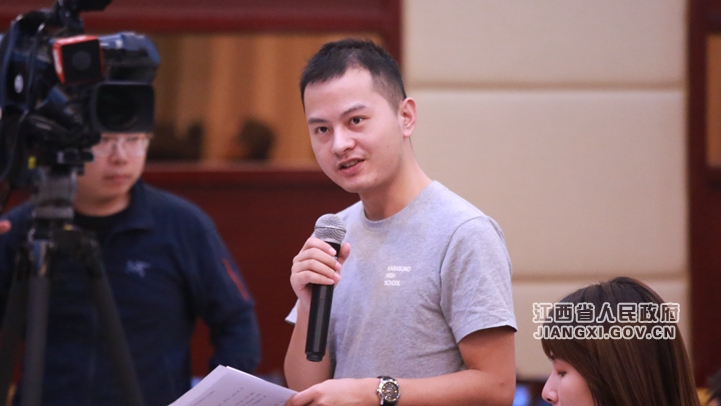
Nanchang Radio reporter (photo by Huang Yuting)
Nanchang Radio reporter:We have noticed that the documents of the two offices have clearly defined a principle, that is, "who sets up, who is responsible and who supervises", and the arbitration commission of our province is set up by the municipal government with districts. Article 14 of the Arbitration Law clearly stipulates that "the Arbitration Commission is independent of the administrative organ and has no subordinate relationship with the administrative organ". I would like to ask Vice Mayor Wan Xiu Qi, who is responsible but not responsible. This seems to be a contradiction. Then, how can the government strengthen its support and guidance for the development of arbitration?
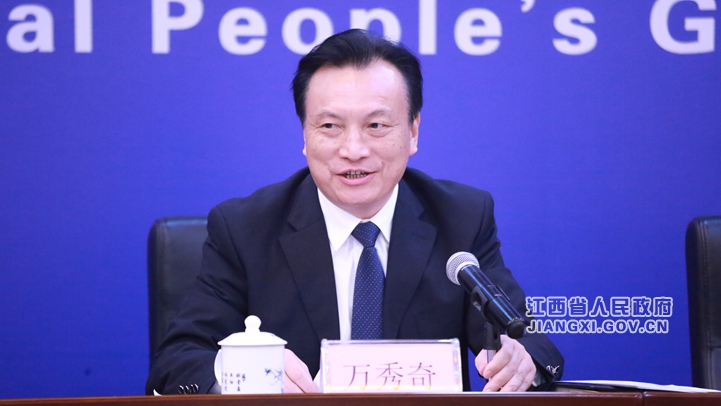
Wan Xiu Qi, Vice Mayor of Nanchang Municipal People’s Government (Photo by Huang Yuting)
Wan Xiu odd:Thank you for your question. You are very careful.
This time, the biggest feature of the provincial party Committee document is also the biggest highlight of the reform and development of arbitration in our province, which is to clarify the management system and mechanism of arbitration work. The "Perfecting the Supervision and Management System of Arbitration" in the second point and the fifth point of the document clearly stipulates that the established municipal government shall perform the main responsibility of supervising the arbitration commission; The Municipal Bureau of Justice is entrusted by the municipal government to contact the arbitration work; The Provincial Department of Justice guides and supervises the relevant localities and departments to implement the arbitration law and relevant policies of the central government, and undertakes the relevant arbitration work assigned by the provincial government. Thus, from the external management system level, the responsibilities and authorities of the municipal government, the municipal judicial bureau and the provincial judicial department are straightened out. It has broken the ambiguous management of arbitration institutions in our province for many years.
The arbitration law proposed by a reporter friend stipulates that the arbitration commission is independent of the administrative organ and has no subordinate relationship with the administrative organ, which means that arbitration should be carried out independently according to law without interference from the administrative organ. However, it does not mean that the arbitration institutions established by the government do not need any supervision and control, but should strengthen management and help support from the organization and outside.
In reality, some government functional departments in our province regard the arbitration commission as an internal organization or subordinate unit for a long time because of the origin of the establishment of the arbitration commission, which does not meet the requirements of the arbitration law and the central documents. In this regard, our province’s documents clearly require that any arbitration commission and its offices as internal organs or subordinate units of government departments should complete the decoupling of people and property before the end of this year. As a provincial capital city, Nanchang will take the lead in implementing the spirit of the documents of the Central Committee and the Provincial Party Committee, support and guarantee the autonomy of the Arbitration Commission in personnel, finance, salary system, etc., and give full play to the role of the Arbitration Commission in the diversified dispute resolution mechanism. In addition, the provincial party Committee documents also comprehensively sort out the responsibilities and support obligations that the government should bear in promoting the development of arbitration.
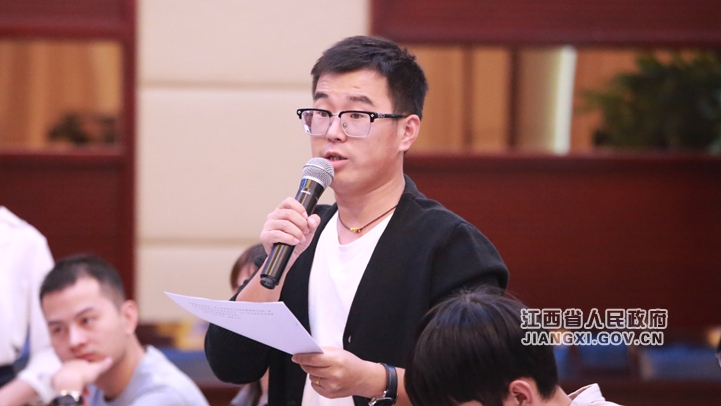
Jiangxi Internet reporter (photo by Huang Yuting)
Jiangxi Internet reporter:Arbitration, as a main legal system to solve civil and commercial disputes besides litigation in people’s courts, has become an important part of diversified dispute resolution mechanism. At the same time, judicial review of arbitration is an important content of arbitration laws in various countries and an important part of the design of arbitration top-level system. Excuse me, Yang Special Committee, how will the courts in our province strengthen the supervision and support of arbitration?
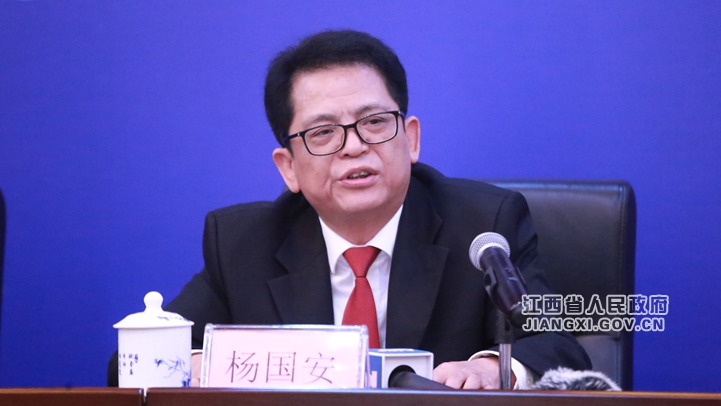
Yang Guoan, a full-time member of the Judicial Committee of the Provincial Higher People’s Court (photo by Huang Yuting)
Yang Guoan:Judicial review of arbitration in China includes support and supervision. In recent years, in accordance with the overall arrangement of the Fourth Plenary Session of the 18th CPC Central Committee "improving the arbitration system and enhancing the credibility of arbitration" and a number of judicial interpretations and normative documents issued by the Supreme People’s Court, courts in our province have properly handled arbitration judicial review cases and executed arbitration award cases in accordance with the law, made efforts to create an arbitration-friendly judicial supervision environment, increased support for arbitration, standardized the people’s courts’ exercise of arbitration judicial review power, and guaranteed and promoted the improvement of arbitration credibility. The main measures are as follows: First, the courts in the province earnestly implement the relevant judicial interpretation requirements, pay equal attention to support and supervision, encourage and standardize peers, support the arbitral awards made according to law, and provide strong judicial guarantee for improving the quality of arbitration. The second is to standardize the judicial review of arbitration and unify the judicial review standards of court arbitration in the province. Therefore, on the basis of investigation, our institute has formulated and promulgated the Guidelines for the Trial of Arbitration Judicial Review Cases of Jiangxi Higher People’s Court, which requires the courts in the whole province to conscientiously implement it, further tighten the arbitration judicial review procedures, and ensure the quality of arbitration judicial review cases. The third is to actively build an exchange platform and improve the docking mechanism of litigation and adjudication. At present, we are coordinating with the Provincial Department of Justice to jointly issue relevant guiding opinions on establishing the linkage mechanism between litigation and arbitration in our province in a timely manner. I believe that the promulgation of opinions will continuously improve the judicial review mechanism of arbitration in our province and further promote the development of arbitration in Jiangxi.
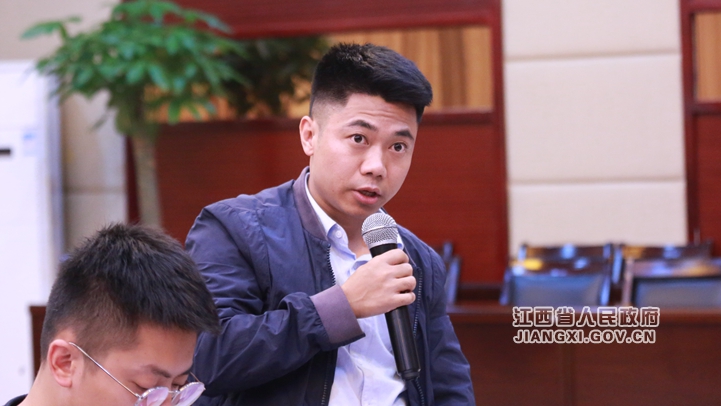
China Jiangxi Network reporter (photo by Huang Yuting)
China Jiangxi Network reporter:As we know, the arbitration system originated in Europe, and the earliest arbitration institution was the product of the activities of the chamber of commerce in the 19th century. After the introduction of arbitration system in China, the biggest contradiction and dispute solved is also in the commercial field. Practice has also proved that the arbitration system has played a very important role in the development of China’s commerce. Excuse me, Vice Chairman Zhou Huaai, how will the business circles in our province play the role of arbitration in commercial disputes?
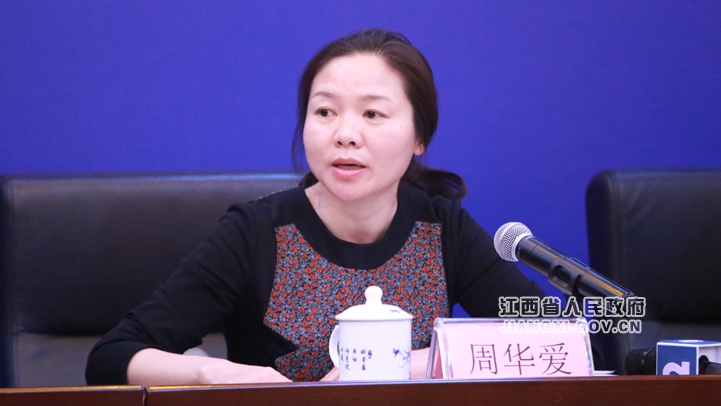
Zhou Huaai, Vice Chairman of the Provincial Federation of Industry and Commerce (photo by Huang Yuting)
Zhou Huaai:Thank you for your question. You have a comprehensive understanding of the context of the civil and commercial arbitration system. Indeed, as early as ancient Greece in Europe, the arbitrator system has been used by Mediterranean coastal city-states and ports to solve commercial and maritime disputes, and even disputes between city-states It is basically after entering the stage of free market economy that the state recognizes and regulates arbitration in legal form. China has introduced the civil and commercial arbitration system since the 1990s. Before that, it was basically an administrative ruling with a strong administrative color. On August 31, 1994, the Ninth Session of the Eighth the NPC Standing Committee deliberated and passed the People’s Republic of China (PRC) Arbitration Law, which came into effect on September 1, 1995. This marked the formal establishment and operation of China’s modern civil and commercial arbitration system, and legally entrusted the Chamber of Commerce with the responsibility of participating in the establishment of arbitration institutions. For more than 20 years, arbitration has played an important role in solving commercial disputes, creating a good business environment, helping Chinese enterprises to go global and participate in international competition. The promulgation of the provincial party Committee document is an important and favorable thing for the business community in our province, and the business community will conscientiously implement the spirit of the document. First, actively participate in the formation of the arbitration commission, increase the proportion of business people in the members of the arbitration commission, and actively contribute to the construction of institutions and organizations. This is the right and obligation given to the Chamber of Commerce by the Arbitration Law. The second is to participate in the preparation and establishment of the Arbitration Association of our province. Encourage organizations and individuals of the Chamber of Commerce to actively apply to join the association and become members, so as to contribute to the construction of self-discipline mechanism in the arbitration industry.Third, strive to train more business people as arbitrators, and constantly improve and expand the intellectual structure of arbitrators.
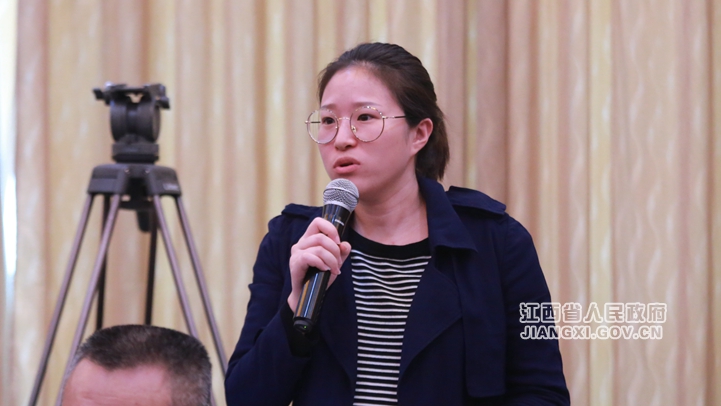
Phoenix Net reporter (photo by Huang Yuting)
Phoenix Network reporter:We have noticed that there is a voice that there is profit-seeking and disorderly competition in arbitration institutions, and there are cases of expanding business, setting up branches at will and vying for the source of the case. May I ask Deputy Director Gong Hexing whether this document has any countermeasures against this disorderly competition, and how to do it specifically?
Gong Hexing:Thank you for your questions. With the development of arbitration for decades, it is true that branches are set up at will to expand their business. In view of this situation, the documents of the two offices have made specific and comprehensive arrangements. First, in the first paragraph, it is clear that the establishment of branches is strict, and the filing and reporting of the establishment of institutions are standardized according to law. The Arbitration Commission may, according to the needs of its work, decide to set up branches or agencies within its jurisdiction and report to the Provincial Department of Justice. If it is really necessary to set up outside the jurisdiction due to special circumstances, it must be approved by the municipal government where the Arbitration Commission is located and where it is established, and reported to the Provincial Department of Justice. The second is to deploy and carry out a special campaign to clean up and rectify the development order of arbitration. Regarding the specific requirements of the "seven prohibitions" put forward in the central document, it is clear that the established municipal government will bear the main responsibility for cleaning up and rectifying, and the Provincial Department of Justice will organize inspection and acceptance of the clean-up and rectification work in various places one by one, and the institutions that fail to pass the acceptance or violate the arbitration law and the provisions of Several Opinions in the future will be corrected according to the law. The third is to further play the role of social supervision. The Arbitration Commission is required to take the initiative to accept media and social supervision, and disclose the articles of association, arbitration rules, service processes, charging standards, annual work reports and financial budget and final accounts reports in a timely manner. In the next step, we will strengthen the construction of the credit system in the arbitration industry and establish a joint disciplinary system for arbitration institutions with malicious competition.
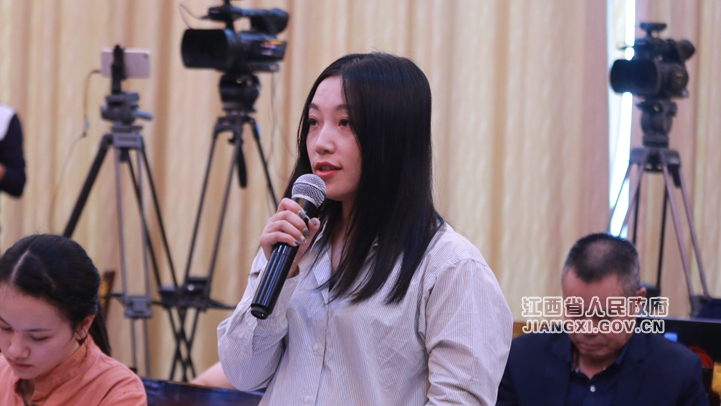
New Legal News reporter (photo by Huang Yuting)
New Legal News reporter:On December 31st last year, the Central Office and the State Council issued Several Opinions on Improving the Arbitration System and Improving the Arbitration Credibility. May I ask Director Zhang Zhonglan what are the key measures proposed by the central government to "reform and improve the internal governance structure of the Arbitration Commission" in the Implementation Opinions issued by our province?
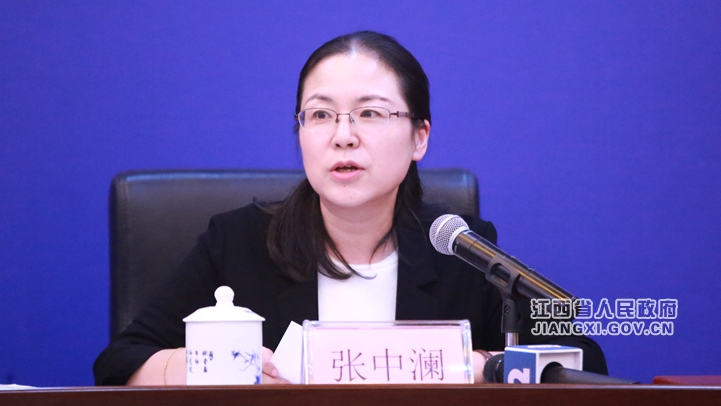
Zhang Zhonglan, Director of the Notarization and Arbitration Division of the Provincial Department of Justice (photo by Huang Yuting)
Zhang Zhongyu:According to the different situations and existing problems of 12 arbitration institutions in our province, the Implementation Opinions put forward corresponding countermeasures from three aspects:
First, strengthen the self-construction of the Arbitration Commission. Improve the internal management system with the articles of association as the core, and strengthen the legal person status of the arbitration commission. Members of the Committee shall be selected and re-elected in strict accordance with the law, and the arbitration development plan, annual work report and financial budget and final accounts report shall be examined and approved in accordance with the articles of association, and candidates for directors, deputy directors, members and heads of executing agencies shall be elected, and major issues such as salary management and performance appraisal scheme shall be determined. Improve the rules of procedure of the Arbitration Commission, and strengthen the duties of the members of the Commission.
The second is to promote the pilot reform of the Arbitration Commission. Actively and steadily promote the reform of the internal management system of the Arbitration Commission, give the Arbitration Commission autonomy in personnel, finance and salary system, and gradually take the road of specialization and professionalization of the staff of the office. Encourage the committees with the nature of public institutions to reform the management system and operation mechanism first, and be consistent with the requirements of the central and provincial classification to promote the reform of public institutions. If the arbitration fee is converted into business service fee, it shall be implemented according to the general rules of enterprise finance and subject to supervision by the departments of finance, auditing, taxation and price. It is clear that the Arbitration Commission should set up an arbitration career development fund. Properly arrange the staff in the office. If the original staff members do not want to stay in the Arbitration Commission, they may, according to their personal status and the nature of preparation, be arranged by the municipal government to return to the corresponding units at the same level according to relevant regulations before the restructuring.
The third is to improve the internal supervision system of the Arbitration Commission. Study and implement the organic combination of the independent award of the arbitration tribunal and the management of the arbitration commission, and improve various internal control systems. Establish a supervision and restriction mechanism for members to serve as arbitrators, and strictly implement the withdrawal system. Establish an arbitration commission’s review system for arbitral awards, an expert consultation system for major and difficult cases, and implement an arbitrator’s information disclosure system to ensure the quality of arbitral awards.
Li Feng:Because of the time, today’s question-and-answer session ends here. Thank you, leaders, journalists and friends. Welcome to continue to pay attention to the construction of arbitration system. The Provincial Department of Justice has compiled news materials, and journalists and friends are welcome to download and view them. If you have any questions, you can consult, communicate or interview after the meeting.
Today’s press conference is over, thank you.